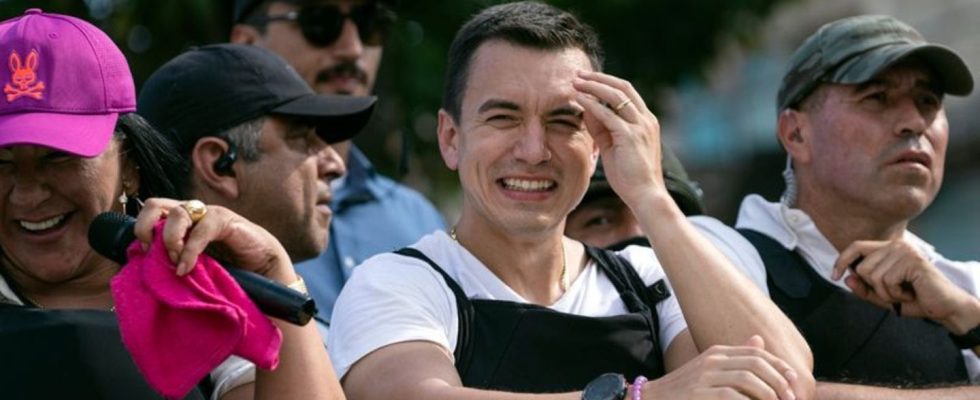Ecuador: 35-year-old Noboa wins election
Daniel Noboa (M) is considered a center-right politician. photo
© Rodrigo Abd/AP
The country is suffering from drug gang violence; a candidate was shot dead shortly before the first round of elections. In the runoff election, the Ecuadorians chose a 35-year-old entrepreneur.
After a bloody election campaign, Ecuadorians have elected 35-year-old Daniel Noboa as their country’s new president. The son of one of the richest men in the South American country received 52.01 percent of the vote in the runoff, as the electoral authority CNE announced on Monday. He is the youngest democratically elected president Ecuador. His rival Luisa González from the camp of former President Rafael Correa, who was convicted of corruption, received 47.99 percent.
“Today we made history. Ecuadorian families have chosen a new Ecuador, a country of security and work,” Noboa wrote on the news platform X, formerly Twitter. “Let’s build a country where promises are not just made during election campaigns and where corruption is punished.”
The economist announced investments in key industries such as energy and logistics, as well as tax benefits for companies that create new jobs. In the fight against organized crime, the future president promised to set up a secret service, militarize borders and ports and dismantle what he saw as an incompetent prison administration.
Gonzáles admits defeat
The left-wing politician González admitted her defeat. She offered her support to the elected head of state. “Ecuador must now be united,” González told supporters. Members of her camp would support reforms in the health, education and security sectors as long as the country’s natural resources were not privatized. Acting President Guillermo Lasso also congratulated Noboa on his election victory.
Noboa ran for the Acción Democrática Nacional (National Democratic Action) party alliance and is considered a center-right politician. During the election campaign, he presented himself as a representative of the younger generation with a market-liberal program for the ailing economy. His father, the banana tycoon Álvaro Noboa, had already unsuccessfully applied for the presidency five times.
However, Noboa will only govern Ecuador for around 18 months from mid-December – until the end of the incumbent President Lasso’s regular term of office. The conservative dissolved parliament in May after two years in office after MPs initiated impeachment proceedings against him over embezzlement allegations. The 68-year-old triggered for the first time the process of “Muerte Cruzada” (mutual destruction) provided for in the 2008 constitution, which made early elections necessary.
Lasso decided not to run again. The first round of elections took place in August during a state of emergency he declared. Eleven days earlier, presidential candidate Fernando Villavicencio, who vowed to fight corruption, was shot after a campaign rally in the capital Quito. Several other politicians have been killed this year. The candidates wore bulletproof vests in public.
Murder rate higher than ever
Violence in the Andean country, which has a population of 17 million, has increased dramatically in recent years. The murder rate of around 25 homicides per 100,000 residents last year was the highest in the country’s history and one of the highest in Latin America. A few days ago, seven suspects in the murder of candidate Villavicencio were found dead in prisons.
Gangs linked to powerful Mexican cartels are fighting for control of drug trafficking routes. Ecuador borders Colombia and is a major transit country for cocaine from South America that is smuggled to the United States and Europe.
If she wins, the 45-year-old González would have become Ecuador’s first female president. She belongs to the left-wing camp of ex-President Rafael Correa (2007-2017), who was convicted of corruption and lives in exile in Belgium. González won the first round of elections with 33.6 percent of the vote. According to the preliminary results, her party, Revolución Ciudadana (Citizens’ Revolution), became the strongest force in the simultaneous parliamentary election with 48 of the 137 seats.

